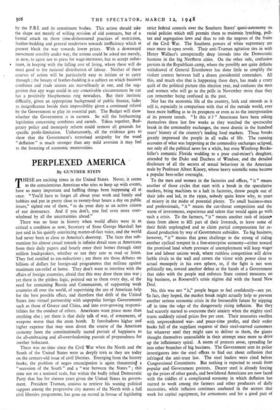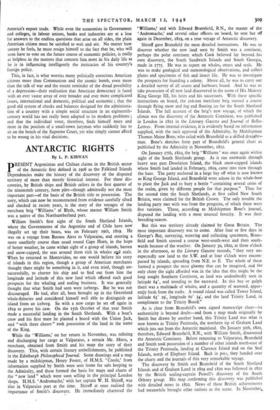PERPLEXED AMERICA
By GUNTHER STEIN
THESE are exciting times in the United States. Never, it seems to the conscientious American who tries to keep up with events, have so many important and baffling things been happening all at once. "You'd have to forget all about your work and family and hobbies and put in pretty close to twenty-four hours a day on public issues," sighed one of them, " to do your duty as an active citizen of our democracy. And if you don't, you feel even more over- whelmed by all the uncertainties ahead."
There was no hour in history when world affairs were in as critical a condition as now, Secretary of State George Marshall has just said in his quietly convincing matter-of-fact voice, and the world had never been as close to America's doorstep. The facts that sub- stantiate his almost casual remark in infinite detail stare at Americans from their daily papers and hourly enter their homes through sixty million loudspeakers, whether or not they care to read or listen. They feel entitled to tax-reductions ; yet there are those debates on billions of dollars for foreign-aid programmes that militate against maximum tax-relief at home. They don't want to interfere with the affairs of foreign countries, afraid that this may draw them into war ; yet there is the pitiless logic, pointed out to them every day, of the need for containing Russia and Communism, of supporting weak countries all over the world, of supervising the use of American help for the best possible effect, and therefore that drift of the United States into virtual partnership with unpopular foreign Governments such as those of Greece and China, and into ever-growing responsi- bilities for the conduct of others. Americans want peace more than anything else ; yet there is that daily talk of war, of armaments, of weapons worse than the atom bomb. It foreshadows higher and higher expense that may soon divert the course of the American economy from the constitutionally sacred pursuit of happiness to the all-embracing and all-overshadowing pursuit of preparedness for another holocaust.
There was no time since the Civil War when the North and the South of the United States were as deeply torn as they are today on the century-old issue of civil liberties. Emerging from the history books, the problem of negro emancipation is again threatening a " secession of the South " and a " war between the States " ; this time not on a national scale, but within the badly jolted Democratic Party that has for sixteen years given the United States its govern- ment. President Truman, anxious to retrieve his waning political support among the progressive city masses of the North with a full civil liberties programme, has gone on record in favour of legislating strict federal controls over the Southern States' quasi-autonomy on racial policies which still permits them to maintain lynching, poll- tax and segregation laws and thus to rob the negroes of the fruits of the Civil War. The Southern powers of white supremacy are once more in open revolt. Their anti-Truman agitation ties in with Henry Wallace's unexpectedly deep inroads into the Democratic bastions in the big Northern cities. On the other side, confusion persists in the Republican camp, where the possibly not quite definite withdrawal of General Eisenhower has done little to simplify the violent contest between half a dozen presidential contenders. All this, and much else that is happening these days, has made a crazy quilt of the political picture this election year, and confuses the men and women who will go to the polls in November more than they can remember being confused in the past.
Nor has the economic life of the country, lush and smooth as it still is, especially in comparison with that of the outside world, ever been more baffling as to its prospects or even as to the interpretation of its present trends. " Is this it ? " Americans have been asking themselves these last few weeks as they watched the spectacular break in the commodity exchanges, the most drastic in the hundred years' history of the country's leading food markets. Those breaks greatly impressed the people in all walks of life. The running accounts of what was happening at the commodity exchanges eclipsed, not only all the political news for a while, but even Winthrop Rocke- feller's romantic Florida wedding to a poor coal-miner's daughter, attended by the Duke and Duchess of Windsor, and the detailed disclosure of all the secrets of sexual behaviour in the American male by Professor Albert Kinsey, whose heavy scientific tome became a popular best-seller overnight.
To the men and women in the factories and offices, " it " means another of those cycles that start with a break in the speculative markets, bring machines to a halt in factories, throw people out of their jobs and led, in the 1930s, nobody quite knew why, to years of misery in the midst of potential plenty. To small business-men and professionals, " it " means the cut-throat competition and the waste of investments, experience and talent that would again go with such a crisis. To the farmers, " it " means another rash of injunc tions from above to ]fill part of their livestock, to leave some of their fields unploughed and to claim partial compensation for re- duced production by way of Government subsidies. To big business, however, " it " means that great challenge to the strong of riding another cyclical tempest in a free-enterprise economy—either toward the promised land where pressure of unemployment will keep wages low and labour unions weak, where ruthless competition will drive feeble rivals to the wall and crown the victor with power close to actual monopoly in his own sphere, or, if the fight is not won politically too, toward another defeat at the hands of a Government that sides with the people and enforces State control measures on big business, as Roosevelt's crisis regime did with the hated New Deal.
No, this was not " it," people began to feel confidently—not yet. 'In fact, they hoped, the market break might actually help to prevent another serious economic crisis in the foreseeable future by nipping off in time the -edge of the dangerously rising inflation. But they had scarcely started to overcome their anxiety when the mighty steel trusts suddenly raised prices five per cent. Their treasuries swollen with unprecedented war- and peace-time profits, and their order books full of the suppliant requests of their steel-starved customers for whatever steel they might care to deliver to them, the giants thought themselves unassailable in their attempt once more to drive up the inflationary spiral. A storm of protests arose, spreading far into other branches of big business. The Government sent its police investigators into the steel offices to find out about collusion that infringed the anti-trust law. The steel leaders were cited before Congressional Committees. But nothing is expected to result from popular and Government protests. Dearer steel is already forcing up the prices of other goods, and bewildered Americans are now faced with the riddles of a complicated economy in which deflation has started to work among the farmers and other producers of daily necessities, while inflation continues unabated in the sectors that work for capital equipment, for armaments and for a good part of America's export trade. While even the economists in Government and college% in labour unions, banks and industries are at a loss for answers to the endless questions that arise on all sides, the plain American citizen must be satisfied to wait and see. No matter how uneasy he feels, he must resign himself to the fact that he, who will soon have to vote on the future course of economic policies, is really as helpless in the matters that concern him most in his daily life as he is in influencing intelligently the intricacies of his country's foreign policy.
This, in fact, is what worries many politically conscious American citizens more than Communism and the atomic bomb, even more than the talk of war and the recent reminder of the dread possibility of a depression—their realisation that American democracy is faced with an ever vaster array of ever brnader and ever more complicated issues, international and domestic, political and economic ; that the good old system of checks and balances designed for the administra- tion of a country with a simple social structure in an eighteenth- century world has not really been adapted to its modern problems ; and that the individual voter, therefore, finds himself more and more in the position of a small-town juryman who suddenly has to sit on the bench of the Supreme Court, yet who simply cannot afford to be wrong in his vital decisions.



































 Previous page
Previous page